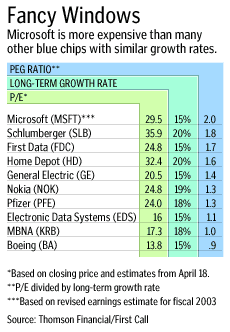
NEW YORK (CNN/Money) -
Microsoft is not a rapidly growing company anymore, at least not based on this week's earnings report, and some analysts and institutional investors are starting to say the stock shouldn't be valued like one either.
The world's largest software maker lowered its revenue and earnings targets for the current quarter and for its next fiscal year on Thursday, implying that earnings growth would be just 4 to 6 percent in fiscal 2003. Not exactly scintillating, especially considering that Microsoft's earnings have grown at an average rate of 26.5 percent a year over the last five years according to First Call, which tracks corporate earnings data.
Based on Microsoft's new target of 41 or 42 cents a share for earnings for its fourth quarter ending in June, announced Thursday, the company would earn $1.82 or $1.83 a share in the current fiscal year. At the same time, Microsoft (MSFT: Research, Estimates) reduced its fiscal 2003 earnings target to a range of $1.89 to $1.92 a share. Analysts were expecting Microsoft to earn $2.01 in fiscal 2003.
Yet Microsoft stock rose Friday, thanks in part to analyst upgrades by Merrill Lynch and First Albany. (Never mind the fact that Merrill is being probed by the New York State Attorney General's office for allegedly telling investors to buy stocks that the firm internally thought were pieces of a word synonymous with excrement.)
Not worth a big premium
Simply put, Microsoft is trading at a valuation that seems too rich given its deteriorating fundamentals, according to some analysts and investors. The stock is currently trading at about 30 times the newly-reduced earnings estimates for fiscal 2003. That's two times the consensus long-term estimated growth rate of 15 percent a year for the next three to five years, according to First Call.
Richard Williams, an analyst with Summit Analytic Partners, says that historically, mature software stocks tend to trade at just 0.5 to 1.5 times their long-term growth rates. In other words, it appears that Microsoft is approaching maturity. Two years ago, with the Nasdaq at its peak, analysts expected Microsoft's earnings to grow at a 25 percent rate annually. Summit Analytic Partners is an independent research firm focusing on the software sector. The firm does not own shares in any of the companies it follows, nor does it have investment banking ties to them.

And if you take a look at the chart to the right, you'll see that Microsoft is trading at a much higher PEG ratio -- its price-to-earnings multiple divided by the company's long-term growth rate -- than many other widely-held stocks with similar growth rates. Of course, highly cyclical industrial companies like Boeing and financial services firms like credit card lender MBNA tend to trade at discounts to technology companies, due to their economic and interest rate sensitivity. So Microsoft doesn't deserve a multiple as low as Boeing or MBNA.
But it's worth noting that Microsoft is trading at a premium to companies like Home Depot and General Electric, two other Wall Street darlings that typically post solid earnings increases year in and year out. A spokeswoman for Microsoft would not comment about the stock's valuation.
If Microsoft's fundamentals were improving, it might be kosher to argue that it deserves a premium valuation. But the company is still highly dependent on the struggling personal computer business. And the Xbox, Microsoft's widely-hyped gaming console, is apparently not doing as well as the company had initially hoped. To that end, Microsoft announced price cuts for the Xbox in Europe and Australia.
"Microsoft is a stock that tends to get a high premium because of its historical strength in the software market. That strength is not as vibrant as it used to be," says Sanjiv Hingorani, an analyst with Dresdner Kleinwort Wasserstein. Hingorani reiterated a "hold" rating on Microsoft Friday morning and lowered his earnings estimate for fiscal 2003 to $1.92 a share from $2.08.
| |
 More Microsoft Coverage
More Microsoft Coverage
| |
| | |
| | |
|
Alex Vallecillo, senior portfolio manager with National City Investment Management Co., the subadvisor for Armada Funds, says that Microsoft is almost like a bond now, an investment that should post steady albeit not spectacular returns. "The growth outlook for Microsoft is very muted. To a large extent it's unexciting. They've been paddling really hard to create new avenues of growth but they're limited by the personal computer side of their business," he says.
Microsoft is the second largest holding in the Armada Large Cap Ultra Fund but Vallecillo says the fund recently sold shares in the low $60's and adds that he would not consider buying again unless the stock fell to $45. Microsoft closed on Friday at $57.20.
To be sure, there's much to like about Microsoft. It is still the dominant company in desktop software. And Windows continues to be pretty much the only operating system that matters, despite the government's lengthy anti-trust trial and the presence of lower-cost alternatives like Linux. Plus, the company's balance sheet is so clean you could eat off it, with no debt and a mind-boggling $38.7 billion in cash and short-term investments.
Just don't call it a growth stock anymore.

|

